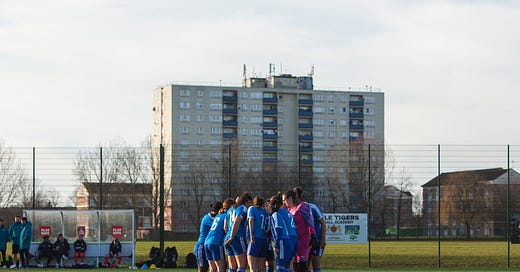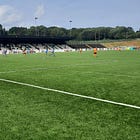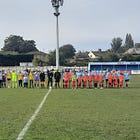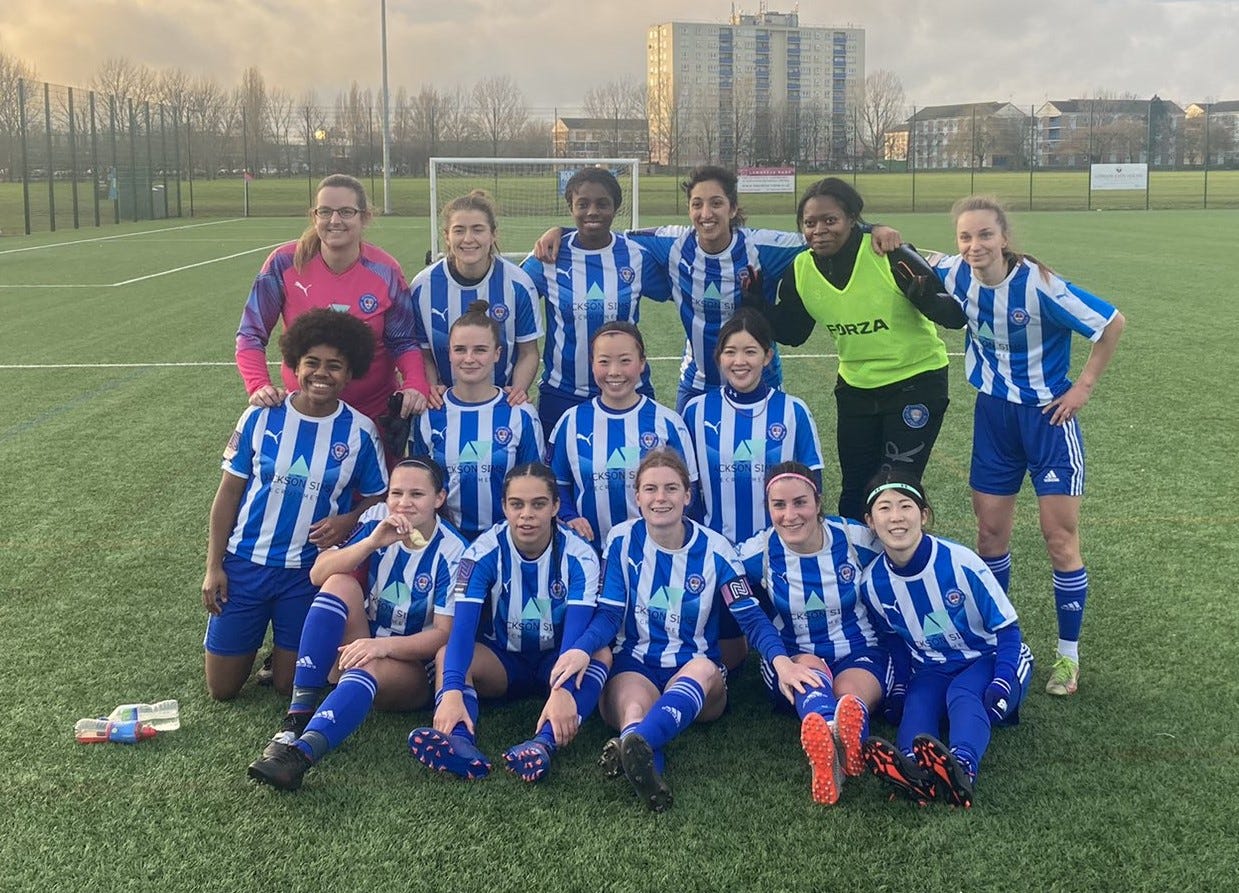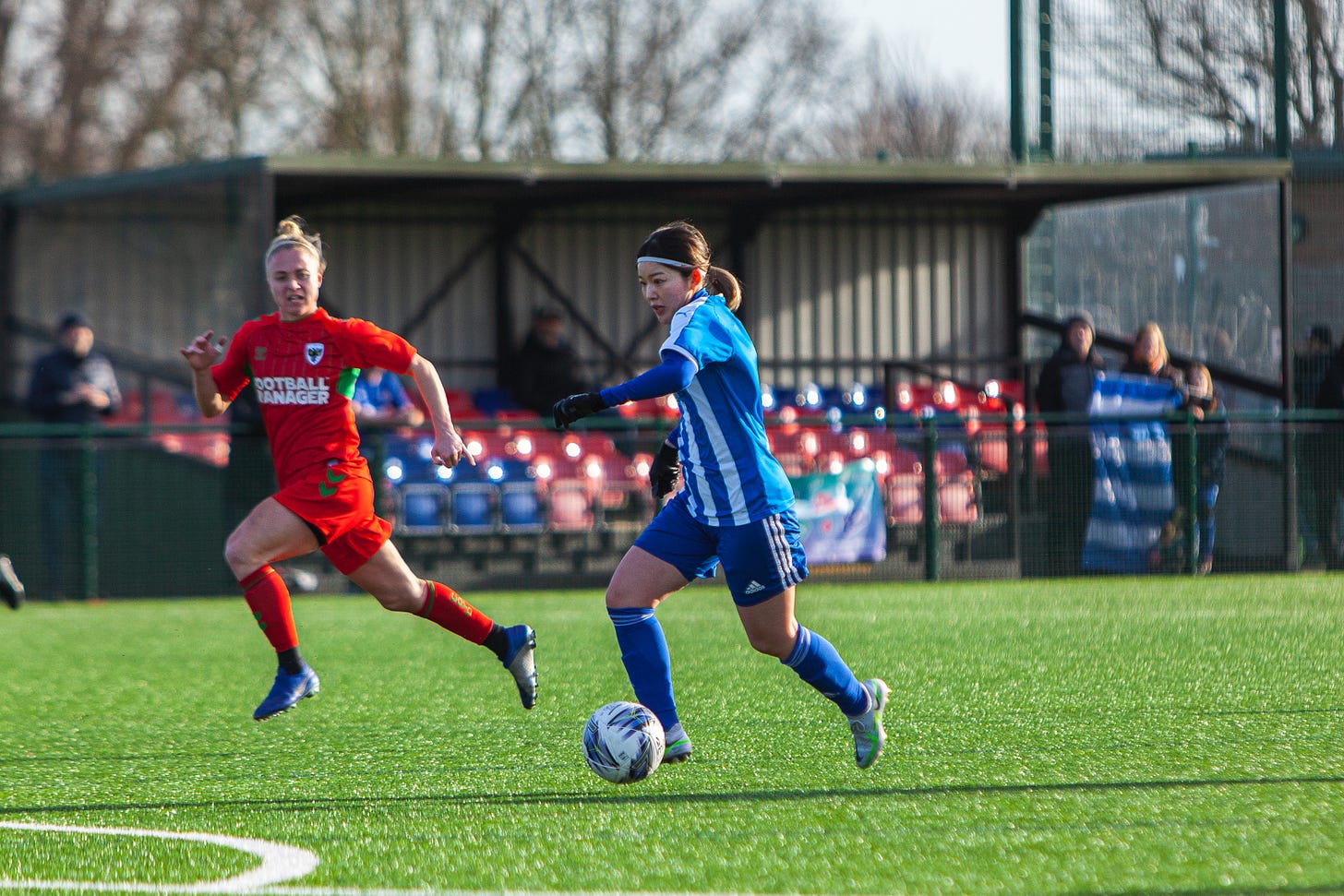Inside the Lower Leagues: Actonians' unique philosophy
Fourth-tier side Actonians is a club doing things very differently. Four first teams and more than 18 nationalities within them. This is a club relying on community spirit in an era of big spending.
Gunnersbury Park emerges out of the cold winter gloom, a vast green space in the middle of Acton in West London.
It’s home to multiple tennis courts, cricket fields, a museum, a lake, a mansion, a college, a military fitness centre, a community garden and, and it’s very heart, a couple of 3G football pitches.
It is the very definition of community. As I walk down the pitch-black path to the central hub, beams of light appear everywhere. Cars, with families and their children pouring out of them, the sound of low-flying planes overhead constantly gliding in towards nearby Heathrow every 30 seconds.
But above anything else, the area is home to fourth tier side Actonians Ladies, a club that beautifully sums up the term community - when you get to know the story.
Founded in 1998 as Chiswick United, they only became Actonians in 2008 and have risen up the leagues to the Women’s National League Southeast One, despite being an independent side with next to no outside funding.
Given they have little financially compared to their rivals, they more than compete. Last season they finished fifth as Billericay Town took the only promotion spot, one point clear of Hashtag United.
Inside the Lower Leagues is a series of regular features on WFC, available for just £45 for 12 months, paid in one go, or a £6 a month rolling subscription, plus everything else in our Premium section.
All subscriptions come with a 7-day free trial to allow you to explore our full archive.
Plus, guarantee you everything that is to come over the next 12 months…
Check out other Inside the Lower Leagues features…
This season they are fourth, but the heavily-funded Hashtag are running away with the league, and despite their best efforts, it’s almost impossible for community-funded Actonians to keep up and move up the pyramid any further.
That means they have to find other ways of competing, so they use what they have, the community itself.
Because outside the confines of the 3G pitch in Acton, this is a truly unique club. They have four first teams. The first team which competes in the FA WNL, a reserves team, a third team and now a recreational fourth team, created only recently due to high demand.
As their manager Danny Harrigan tells me later in the evening, “This is a community, we don’t turn anyone away, we will just create another team.”
Harrigan juggles his role as first team manager with a full-time job in the academy at QPR during the day, and like everyone has other commitments around the club, such is the part-time nature of the set up, but his passion is infectious.
As we speak on the side of the pitch, there are dozens of young girls training on the opposite 3G.
One girl no more than eight years old has a Manchester City shirt on. But it’s not Haaland or De Bruyne on the back, it’s ‘Kelly’.
There is also a ‘Russo’ Manchester United shirt and a ‘Williamson’ Arsenal shirt, plus several England shirts. The change since the summer has been huge.
“The amount of girls on that pitch since the summer has more than trebled,” says Harrigan, as we turn to watch them going through a shooting drill with their supportive coaches.
Even in the wind and the rain of a cold January night, these girls have come out to try and emulate their idols. People walk their dogs down the path running parallel to the pitches, families group together and watch on, the sense of community is everywhere.
While the game at the top level in England has reached record crowds, Sky TV deals and brands now wanting to be associated with superstar Lionesses, there is something peacefully reassuring about the safe surroundings of this little corner of Acton.
Linda Fox, the club’s chairperson, arrives and comes over to say hello. Her story too is one of a community that you just can’t let go of, quite literally in her case.
Originally from Sweden, Fox moved to London over 20 years ago and played for the club during its founding year as Chiswick back in the late 1990s.
25 years later, she is still here, now running the show. What was originally a short trip to study in the UK became a lifetime.
She tells me how she met her future husband a month before going home and ended up coming back and has never left. Fox herself still plays for the club’s third team and she points towards the under 14s team training in the corner to let me know her daughter is there, who is also now part of the Actonians family.
Fox, like many, is bound to the club. in every facet of her life. It is one where once you are connected, you can’t escape it.
Because beyond the four first teams there is a youth team for every age group from U9 to U17, nobody in the area is exempt from being a part of Actonians.
Fox admits there are financial limitations. “The parents pay, we are completely self-funded. First team players used to pay but they don’t have to now.
“We can offer some of them expenses who come from far away, like our goalkeeper who travels from Peterborough, but we are reliant on the community.”
A lot of the younger players are in education and being a part-time side training in the evenings, the usual issues arise.
There is currently a travel strike across the UK and players are struggling to make it to training on time, but the club is more than understanding.
In fact, as Harrigan explains, some even work in the industry. “We have bus drivers, train drivers, but we have a lot of teachers, we have a model too. Everyone does something outside of here.”
Harrigan extends that community spirit to the fact he will pick players up and drop them off again after training or matches, such is his want to keep the team together and maintain their spirit and togetherness which allows them to compete, but keeping the team together is harder than he would hope, given the money being spent elsewhere.
So, how do they compete? A look at their squad list on their website tells you everything. Across their four senior teams, they have players from over 18 different nations, as far and wide as South America and Japan.
Last season, New Zealand international Ashleigh Ward played for the side while juggling national team duties against world champions USA at the SheBelieves Cup, before moving to Southampton in the summer.
Ward is one of the club’s many success stories.
London is a diverse community, and in Acton in particular there is a large Japanese community, as both Fox and Harrigan explain, which has allowed them to attract three players from the country in the past year.
Eyebrows were raised when rumours started to swirl on social media last summer when reports broke of Japanese players heading for the FA WNL, even more so when it was tier four rather than tier three, but Actonians can offer so much off the field.
Chihiro Ebine, Anna Shimizu and Natsumi Kanno all arrived at the club via a community programme which allows them to live and study English in the area.
Their agent, Tadashi Sakai, explains “I asked all clubs in tier three and tier four about players. Our head office is in London so we can support them, arrange accommodation, language school and other things.”
All the girls come to study English Language as part of the programme and they can choose to live with a host family in the area or a five-bedroom flat the agency owns.
“Some clubs replied but we chose Actonians because they were so kind, have great hospitality and have a second and third team for players too,” says Sakai.
While keeping things together is tough when players finish their studies and go back home, some do stay longer, with chairperson Fox the gold standard example.
But as nifty little forward Dominika Netschova is introduced to me by Fox, it’s clear some very much find a home here, and Slovenian Netschova has now lived in London seven years.
There’s Micaela Lopes, Maria Ledezma-Viso, Meila D’Santos and Alessandra Barreca too, and that’s just in the first team.
The reserves, currently top of their league, have Sin Sooriyakumar, Elisa Dogor, Ines Goycoolea and Zita Lovaszi, among others. The list of players from all corners of the world continues into the third team and the recreational side, the depth of what this fourth tier side is able to attract is staggering.
The Japanese girls huddle in a corner of the 3G pitch as they get ready for training. They speak very little English as yet, and I’m told Amina speaks almost none at all as a new arrival, but they fit in well.
“Everyone really gets along, many are good friends away from the field,” says Fox, as she continues to watch her daughter train as the first team trickle in.
Harrigan is already prepared for no shows given the travel strikes and the logistical challenges as he discusses how and when to rearrange a cup game with Fox.
These girls all dream of being their heroes, but they are there primarily because they love football. Harrigan, a local boy, tells me he saw Chloe Kelly and her dad in the local pub – Kelly is a big QPR fan – shortly after the Euros and how it was the first time she’d been recognised in there.
In reality, Kelly’s fame compared to what Actonians has offers a stark reality to the differences between the haves and the have nots, but this club offers something different. It offers a modern-day throwback to what women’s football once was, and at its heart very much still is.
Community.

